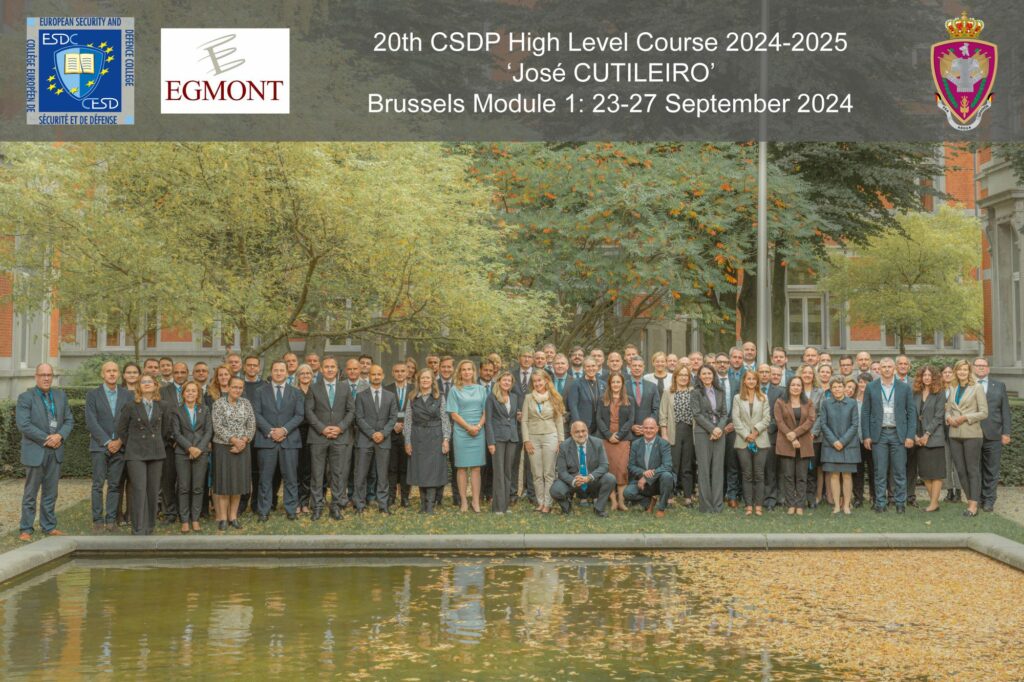High Level Course – Session 2024-2025
High-Level Course: a benchmark course in terms of European security and defence
The Common Security and Defence Policy High-Level Course, more commonly known as the High-Level Course (HLC), is an essential course offered by the European Security and Defence College (ESDC) in collaboration with the Egmont Institute and the RHID. This four-week programme, divided into several modules, stands out for the quality of the participants, the relevance of the topics covered and the excellence of the speakers.
Objectives of the High-Level Course
The main aim of the High-Level Course is to enhance understanding of the issues at stake in the European Union’s Common Security and Defence Policy (CSDP), which is one of the major components of the Common Foreign and Security Policy (CFSP). The course aims to broaden participants’ knowledge of the European security architecture and develop their perception of contemporary threats, while encouraging exchanges between experts from various EU Member States and candidate countries.
A rigorous selection process
The HLC audience consists of around 70 high-level experts, carefully selected by the ESDC from applications submitted by the European institutions, the Member States and the candidate countries. The aim is to bring together experienced civil servants from a variety of backgrounds to enrich debates and strengthen European synergies on defence and security issues.
Organisation of the High-Level Course
The HLC takes place from September to June in four different European capitals. Each module lasts five days and explores a specific theme. The first module, organised in Brussels under the responsibility of the Royal Higher Institute for Defence (RHID), focuses on the governance of the CFSP/CSDP and the workings of the European institutions.
The other three modules are organised in other European capitals each year by local training organisations. Here is an overview of the first module of the 2023-2024 session, which was held in Brussels:
Programme for Module 1 – CFSP/CSDP Governance
For this first module, we had the honour to welcome renowned speakers throughout the week.
- Monday 23 September: the day began with a series of introductions on the functioning of the ESDC and the framework of the course, followed by discussions on the EU’s global strategy and reflections on the implementation of the Strategic Compass.
- Tuesday 24 September: participants explored key topics such as the CSDP concept, civilian and military missions, and crisis management within the EU.
- Wednesday 25 September: an enriching session on topical issues such as the EU’s role vis-à-vis China and EU-UN cooperation on peace and security.
- Thursday 26 September: this day was marked by lectures on climate change and its strategic impact, as well as an interactive discussion on the challenges of disinformation.
- Friday 27 September: the module ended with an evaluation and a round table on EU-NATO cooperation, before a closing ceremony for the participants.
A tribute to José Cutileiro
The 20th edition of the High-Level Course was named in tribute to José Cutileiro, a renowned Portuguese diplomat and writer. In her ice-breaking welcome address, Ambassador Ana Paula MOREIRA, Permanent Representative of Portugal to the Political and Security Committee (PSC) of the European Union, recalled the life of José Cutileiro, who held several important posts, including Secretary General of the Western European Union (WEU) and United Nations Special Envoy to Bosnia-Herzegovina and Serbia. His diplomatic career has played a key role in promoting European security and defence. This impressive record resonates perfectly with the objectives of the HLC.
Conclusion
The High-Level Course is a unique programme that enables high-level European experts to learn about security and defence issues while promoting cooperation between EU Member States. Through rich exchanges and high-quality presentations, this course provides an essential platform for anticipating the challenges of the European Union’s common defence policy.

